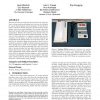Free Online Productivity Tools
i2Speak
i2Symbol
i2OCR
iTex2Img
iWeb2Print
iWeb2Shot
i2Type
iPdf2Split
iPdf2Merge
i2Bopomofo
i2Arabic
i2Style
i2Image
i2PDF
iLatex2Rtf
Sci2ools
118
Voted
CCS
2010
ACM
2010
ACM
Security analysis of India's electronic voting machines
Elections in India are conducted almost exclusively using electronic voting machines developed over the past two decades by a pair of government-owned companies. These devices, known in India as EVMs, have been praised for their simple design, ease of use, and reliability, but recently they have also been criticized following widespread reports of election irregularities. Despite this criticism, many details of the machines' design have never been publicly disclosed, and they have not been subjected to a rigorous, independent security evaluation. In this paper, we present a security analysis of a real Indian EVM obtained from an anonymous source. We describe the machine's design and operation in detail, and we evaluate its security in light of relevant election procedures. We conclude that in spite of the machines' simplicity and minimal software trusted computing base, they are vulnerable to serious attacks that can alter election results and violate the secrecy of the...
Related Content
| Added | 06 Dec 2010 |
| Updated | 06 Dec 2010 |
| Type | Conference |
| Year | 2010 |
| Where | CCS |
| Authors | Scott Wolchok, Eric Wustrow, J. Alex Halderman, Hari K. Prasad, Arun Kankipati, Sai Krishna Sakhamuri, Vasavya Yagati, Rop Gonggrijp |
Comments (0)

